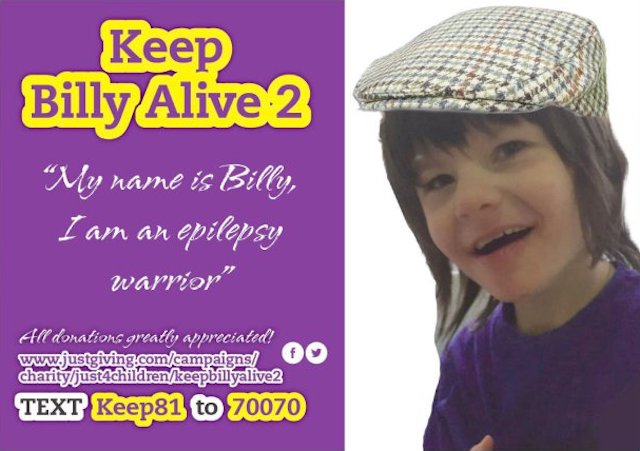The Home Office Can No Longer Pretend Cannabis Doesn’t Save Lives
Here’s a fact to astound and amaze: the UK is the world’s largest producer and exporter of medical cannabis. According to a UN report, Britain produced 95 tons of the stuff in 2016, accounting for nearly 45 percent of global supply. Here’s another fun fact: under UK law, it’s almost impossible to obtain potentially life-saving cannabis-based medicines.
Billy Caldwell’s story illustrates the perversity of this situation. On Monday the 11th of June, 12-year-old Billy arrived at Heathrow Airport on a flight from Canada. His mother, Charlotte, was carrying a supply of cannabis oil, a drug which had been successfully used to bring Billy’s epileptic seizures under control for more than nine months. The medicine was seized by UK Customs officials and Billy, deprived of his medicine, almost immediately saw his “life-threatening” seizures return. Four days after his arrival at Heathrow, he was taken by ambulance to Chelsea and Westminster Hospital in what his mother described as a “crisis situation”.
This traumatic week represented just the latest developments in a long-running battle being fought by Charlotte in a bid to secure effective treatment for her son. In April of 2017, Billy had been prescribed cannabis oil by a doctor in Northern Ireland, but after months of successful treatment, he was denied further access to the drug after the Home Office instructed his GP to stop issuing prescriptions. Charlotte was forced to travel to Toronto to obtain a six-month supply of Billy’s medicine to bring back to the UK. “Of course I worry about breaking the law,” she told the Mail on Sunday. “But I want my son illegally alive rather than legally dead.”
Charlotte met with Home Office ministers, but despite her pleas, and a warning that they were signing her son’s death warrant, the medicine was not returned. The situation only changed when Billy was admitted to hospital. On Saturday the 16th of June, Sajid Javid announced he was using his “exceptional power as Home Secretary” to issue a licence allowing Billy’s treatment to continue. “This is a very complex situation, but our immediate priority is making sure Billy receives the most effective treatment possible in a safe way,” he said.

To most observers, there was nothing complex about the situation at all. A 12-year-old boy with a serious illness was responding to treatment – until the Home Office intervened. Ministers had deprived a sick child of his potentially life-saving medicine.
How did we end up here? While much of the rest of the world has begun to recognise the potential benefits of cannabis for medical uses, the UK has lagged behind. To date, only one cannabis-based medicine has been approved for use in the UK, and its supply is strictly limited. Sativex is used to treat MS sufferers, but is only available by NHS prescription in Wales. This is in large part down to the fact that cannabis is a schedule one drug in Britain, severely restricting the circumstances in which research can take place into its medicinal benefits. In the government’s eyes, it has “no therapeutic value”.
In light of the developments in Billy Caldwell’s case, it is hard to see how ministers can credibly maintain this position. Javid stressed that his decision to allow Billy’s treatment with cannabis oil was taken on “the advice of senior clinicians”, who presumably contradicted the government’s official stance. It is difficult to see how ministers can argue that this was an isolated case. Many more families have been fighting to access cannabis-based treatments.
“Today, this was about Billy,” said his mother Charlotte, speaking to reporters outside the Chelsea and Westminster Hospital after Javid’s decision. “But from tomorrow, this is about the thousands of other children and families in our country.”
There are signs that the whole debate about medical cannabis has been the subject of a dramatic shift. When the Mail Online reported the Caldwells’ story, the usually toxic comments section was full of supportive sentiments. One representative comment suggested Charlotte had been “Doing what any parent would in that situation. Respect to her. Let the boy have his medicine. Time for medical legalisation in the UK.” In the last few days, Conservative politicians have issued statements calling for action to prevent this situation arising again. Crispin Blunt, MP for Reigate and co-chair of an all-party parliamentary group on drug policy reform, chided the UK’s “absurd drug laws on medicine derived from cannabis”. George Freeman, MP for Mid Norfolk and chair of the Conservative Policy Forum, said: “The current law is a mess.”
For the time being, the Caldwells’ fight is far from over. So far, the Home Office has released just a small amount of cannabis oil to allow Billy’s treatment to continue in hospital. It’s unclear what will happen once this supply runs out. Charlotte said: “He has 20 days’ worth of anti-epileptic seizure drugs. What happens after that? Another battle?”
It’s possible, but everything points to the fact that ministers have already acknowledged defeat. This morning, in an appearance on the BBC’s Today programme, Jeremy Hunt was questioned by an audibly emotional John Humphrys about the Caldwell’s ordeal. Humphrys asked the Health Secretary: “This is appalling, isn’t it, by any measure?” Hunt replied that the government would be reviewing the law surrounding cannabis oil. He conceded: “I don’t think anyone who followed that story could sensibly say we’re getting the law on this kind of thing right.”
This article originally appeared on VICE UK.